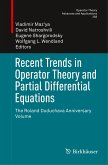This second in the series of three volumes builds upon the basic theory of linear PDE given in volume 1, and pursues more advanced topics. Analytical tools introduced here include pseudodifferential operators, the functional analysis of self-adjoint operators, and Wiener measure. The book also develops basic differential geometrical concepts, centered about curvature. Topics covered include spectral theory of elliptic differential operators, the theory of scattering of waves by obstacles, index theory for Dirac operators, and Brownian motion and diffusion. The book is targeted at graduate students in mathematics and at professional mathematicians with an interest in partial differential equations, mathematical physics, differential geometry, harmonic analysis, and complex analysis.
The third edition further expands the material by incorporating new theorems and applications throughout the book, and by deepening connections and relating concepts across chapters. It includes newsections on rigid body motion, on probabilistic results related to random walks, on aspects of operator theory related to quantum mechanics, on overdetermined systems, and on the Euler equation for incompressible fluids. The appendices have also been updated with additional results, ranging from weak convergence of measures to the curvature of Kahler manifolds.
Michael E. Taylor is a Professor of Mathematics at the University of North Carolina, Chapel Hill, NC.
Review of first edition: "These volumes will be read by several generations of readers eager to learn the modern theory of partial differential equations of mathematical physics and the analysis in which this theory is rooted."
(Peter Lax, SIAM review, June 1998)
The third edition further expands the material by incorporating new theorems and applications throughout the book, and by deepening connections and relating concepts across chapters. It includes newsections on rigid body motion, on probabilistic results related to random walks, on aspects of operator theory related to quantum mechanics, on overdetermined systems, and on the Euler equation for incompressible fluids. The appendices have also been updated with additional results, ranging from weak convergence of measures to the curvature of Kahler manifolds.
Michael E. Taylor is a Professor of Mathematics at the University of North Carolina, Chapel Hill, NC.
Review of first edition: "These volumes will be read by several generations of readers eager to learn the modern theory of partial differential equations of mathematical physics and the analysis in which this theory is rooted."
(Peter Lax, SIAM review, June 1998)
From the reviews of the second edition: "This substantial three-volume work is an upgraded version of the comprehensive qualitative analysis of partial differential equations presented in the earlier edition. ... Graduate students ... will find these three volumes to be not just a fine and rigorous treatment of the subject, but also a source of inspiration to apply their knowledge and ability to the solution of other challenging problems in the field of partial differential equations. ... an excellent text for all devotees of the charming and thought-provoking byways of higher mathematics." (Christian Constanda, The Mathematical Association of America, June, 2011)








